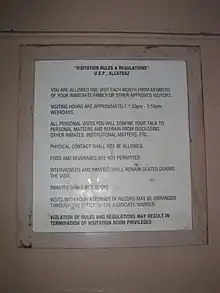Prisoners' rights
The rights of civilian and military prisoners are governed by both national and international law. International conventions include the International Covenant on Civil and Political Rights; the United Nations' Minimum Rules for the Treatment of Prisoners, the European Committee for the Prevention of Torture and Inhuman or Degrading Treatment or Punishment,[1] and the Convention on the Rights of Persons with Disabilities.
| Criminology and penology |
|---|
 |
Rights and advocacy by country
Asia
Europe
North America
- Incarceration in Canada
- In the United States:
- Human rights in the United States
- Incarceration in the United States
- Prisoner rights in the United States
- Decarceration in the United States
- Prisoner abuse in the United States
- Felony disenfranchisement in the United States
- Penal labor in the United States
- Prison rape in the United States
- Organ donation in the United States prison population
- Mentally ill people in United States jails and prisons
- Political prisoners in the United States
- Notable groups:
- Notable events:
- Chain gang
- Convict leasing

Visitation rules at Alcatraz
Oceania
See also
References
- Howard Davis (2003), "Prisoners' rights", Human rights and civil liberties, Taylor & Francis, p. 157, ISBN 978-1-84392-008-3
External links
Organizations working for prisoners' rights:
- American Civil Liberties Union on prisoners' rights
- Human Rights Watch
- Amnesty International
- Prison Activist Resource Center
This article is issued from Wikipedia. The text is licensed under Creative Commons - Attribution - Sharealike. Additional terms may apply for the media files.
